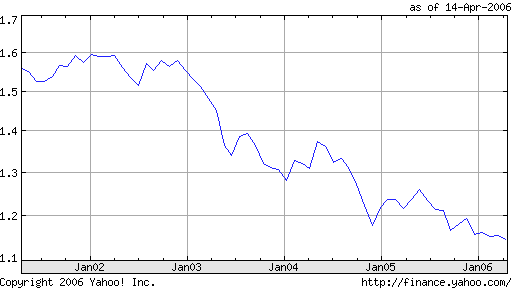It’s been a while since I’ve gone on about U.S. economic policy and currency issues (although I’ve certainly talked about the currency thing enough over the years).
Partly this is because the story isn’t changing: the value of U.S. currency keeps dropping–even against ours, which is so tightly integrated with it.
Here’s the long term chart:

(I’d like to take moment to bitch here about US publishers still using the 1.5 factor to set their Canadian prices, as if the rate had’t changed significantly over the past several years, but I don’t have the energy for a proper rant.)
So why does this keep happening? Well, obviously the answer is much more complicated than anything that you can write up in a paragraph or two, but I would like to point you to an article over on AlterNet that addresses something that is at least part of the problem:
Most pointedly, there has been a fundamental shift in political attitudes towards debt, leading towards fiscal irresponsibility by our leaders in Washington. Since taking office, the Bush administration has added $2.5 trillion to the national debt, from $5.662 trillion when Bush took office in January 2001 up to $8.170 trillion on New Year’s Day 2006. This represents an astounding increase of 44 percent during a period when prior projections suggested a $4 billion surplus. Despite this alarming increase in the debt during Bush’s presidency, no one in a position of power has seriously proposed any measures that would address the root causes of the problem.
Simply put, Americans have become mired in a culture of debt. We buy things we don’t make and don’t need with money borrowed from abroad. America’s economy has shifted dramatically in recent decades from an “old” economy based upon manufacturing capability to a “new and improved” economy based upon services. But increasingly, the services that America offers the world are financial in nature, designed to make it easier for Americans to live beyond their needs. Hence we sink even deeper into debt, comforted by the delusion that foreigners will continue to prop up our economy.
The concluding section of the article includes this bit, bolding is mine:
Because many of these problems are so complex, most Americans have no clue what to do. This unfortunately results in a near total lack of organized pressure on our elected officials to make any structural changes, and nothing gets done. Perhaps the most insidious aspect of all this is that the problems increase only incrementally, until a point at which it is too late to do anything, at which time the economy suddenly goes into a tailspin.
Our challenge is to address the problems before they reach this stage. To do this we must make a commitment to understand what is really happening. …
The article makes some suggestions on how to do that, but the specific ways to do it aren’t important–it’s the acceptance of the fact that as citizens we not only have the right to do these things, we have a responsibility to do so.

